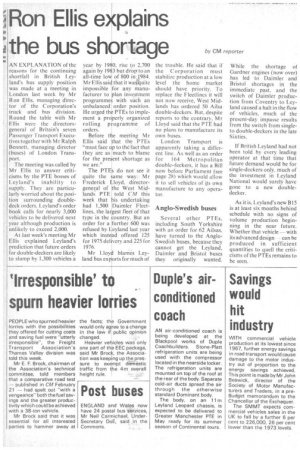Ron Ellis explains the bus shortage
Page 22

If you've noticed an error in this article please click here to report it so we can fix it.
by CM reporter
AN EXPLANATION of the reasons for the continuing shortfall in British Leyland's bus supply position was made at a meeting in London last week by Mr Ron Ellis, managing director of the Corporation's truck and bus division. Round the table with Mr Ellis were the directors-general of Britain's seven Passenger Fransport Executives together with Mr Ralph Bennett, managing director (buses) of London Transport.
The meeting was called by Mr Ellis to answer criticisms by the PTE bosses of Leyland's inability to supply. They are particularly worried about the position surrounding doubledeck orders. Leyland's order book calls for nearly 3,000 vehicles to be delivered next year although production is unlikely to exceed 2,000.
At last week's meeting Mr Ellis explained Leyland's prediction that future orders for double-deckers are likely • to slump by 1,300 vehicles a
year by 1980, rise to 2,700 again by 1983 hut drop to an all-time low of 800 in 1984. Mr Ellis said that it waquite impossible for any manufacturer to plan investment programmes with such an unbalanced order position. He urged the PTEs to implement a properly organized rolling programme of orders.
Before the meeting Mr Ellis said that are PTEs "must face up to the fact that they are as much to blame for the present shortage as we are."
The PTEs do not see it quite the same way. Mr Frederick Lloyd, directorgeneral of the West M idlands PTE told CM this week that his undertaking had 1,500 Daimler Electlines, the largest fleet of that type in the country. But an order for a further 600 was refused by Leyland last year which instead offered 125 for 1975 delivery and 225 for 1976.
Mr Lloyd blames Leyland bus exports for much of the trouble. He said that if the Corporation must stabilize production at a low level the home market should have priority. To replace the Fleetlines it will not now receive, West Midlands has ordered 50 Ailsa double-deckers. But, despite reports to the contrary, Mr Lloyd said that the PTE had no plans to manufacture its own buses.
London Transport is apparently taking a different line. As well as an order .for 164 Metropolitan double-deckers, it has a Bill now before Parliament (see page 28) which would allow it to sell vehicles of its own manufacture to any operator.
Anglo-Swedish buses
Several other PTEs, including South Yorkshire with an order for 62 Ailsas, have turned to the AngloSwedish buses, because they cannot get the Leyland. Daimler and Bristol buses they originally wanted. While the shortage of Gardner engines (now over) has led to Daimler and Bristol shortages in the immediate past, and the switch of Daimler production from Coventry to Leyland caused a halt in the flow of vehicles, much of the present-day impasse results from the switch from singleto double-deckers in the late Sixties.
If British Leyland had not been told by every leading operator at that time that future demand would be for single-deckers only, much of the investment in Leyland National would surely have gone to a new doubledecker.
As it is, Leyland's new B15 is at least six months behind schedule with no signs of volume production beginning in the near future. Whether that vehicle -with its advanced design can be produced in sufficient quantities to quell the criticisms of the PTEs remains to be seen.












































































































































































